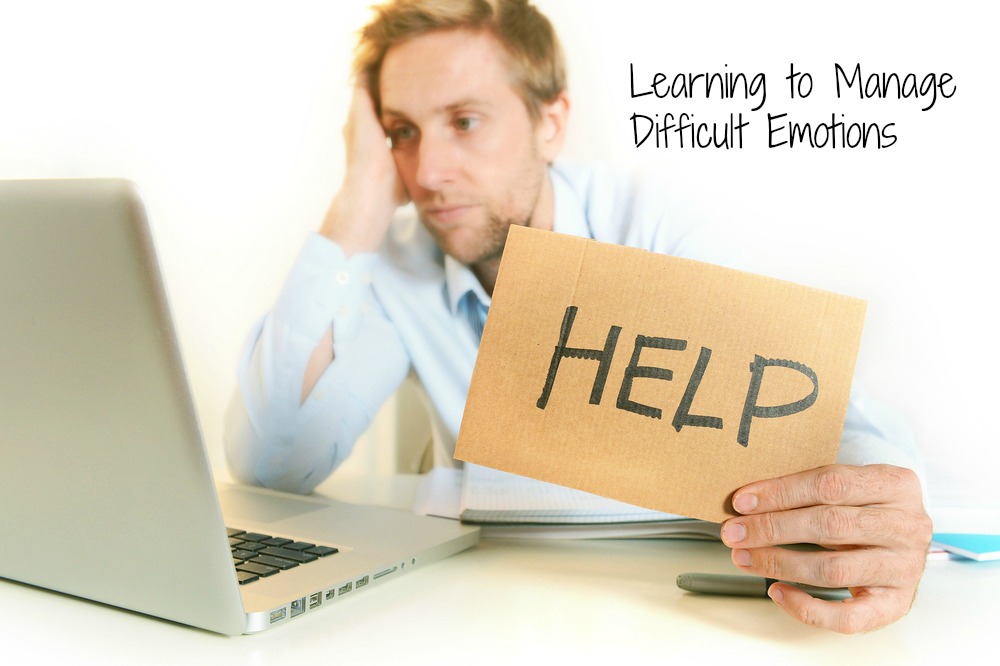Learning to Manage Difficult Emotions
We’ve all had those moments in life when we become so enraged we feel we could explode, or so upset we want to spread our misery to those around us. However, if we don’t effectively manage those extreme feelings, the destruction we cause can be the source of much regret. Take for example a woman who becomes increasingly irritated with her husband for arriving home late from work several days in a row. Although she says nothing for several weeks, she eventually lets it all out in a huge explosion, citing everything he has done wrong during the course of the last few years. She is threatening divorce, feeling there is just no hope for the marriage, feeling unheard. After the hostility subsides, she is aware she has alienated her husband as a result of the attack, and has completely lost the focus of what initially irritated her. She feels guilty and angry towards herself for acting that way and blowing things out of proportion. Her husband is now focused on her attack as opposed to what he did to upset her, and she is then even more adamant that the next time she will not say anything and keep it to herself. The destructive cycle continues.
The difficulty in handling emotions comes when we confuse “managing” our feelings with “suppressing” our feelings. Feelings just happen. They aren’t right or wrong, good or bad. But, the way we choose to act on those sensations is something to evaluate. We can voice our sentiments productively or destructively; and, therein we find the problem, or the solution.
When we suppress our feelings, or believe we should suppress our feelings, the negative emotions build. We become more frustrated, more irritated, feel less understood and more isolated. The feelings can morph into theories of victimization and helplessness. We become a volcano that is ready to spew or one that has already exploded. This can lead to the attitude of great remorse, and subsequent guilt, which in turn begins the cycle all over again. On the other hand, if we allow our emotions to rule us, acting on every impulse, we often suffer the same consequences: shame, isolation and frustration. So how can we learn to balance our emotions with logic in an effort to productively cope with difficult feelings while still allowing ourselves to experience frustration, anger, sadness or other complex moods? The following are a few tips to help you learn to make the most out the ever-changing climate of emotions:
- When you feel strong emotions, articulate what they are. Do you feel sad? Frustrated? Angry? How would you describe the feeling? Write down what you feel.
- Think to past experiences of expressing this emotion. What has worked well, and what has not. Let experience guide you.
- Go for a walk, get involved in another activity, and then reassess your feelings later. Many times, you will find the issue at hand wasn’t really that important and your anger, sadness, irritation has subsided.
- Speak about your feelings using “I statements.” “I feel angry, sad, etc.”
- Set clear boundaries. Sometimes people are afraid to set clear boundaries for themselves because they don’t want to hurt the other person’s feelings. Yet when those unspoken boundaries are violated, they are angry, sad or hurt and act with hostility towards the other. Rather than create such animosity, feel confident in articulating your boundaries as long as you are clear, confident, and calm when explaining them.
- Think in terms of what you can control—yourself. Trying to behave in a way that will get your partner or friend to do what you want is completely unproductive. They will always have the freedom to choose their actions, as will you. What you can do is express yourself, and your choices for how you choose to conduct your life. You have the choice to stay in a relationship in which the other person’s choices are not in keeping with yours, or to not be in such a relationship. However, controlling their choices and their behavior will be difficult, if not impossible.
- Remember that emotions are like the weather: they are guaranteed to change.
There are many tactics for handling difficult emotions. It is important to allow yourself the freedom to feel them, yet it also good to be careful to strike a balance between feeling and expressing them productively. Part of the richness of life comes from the variety of experiences we have, both easy and difficult, good and bad. All of these experiences and their affiliated emotions are the dynamics from which we learn and grow. Each time we confidently and thoughtfully express ourselves, we grow in maturity and self-esteem. As with anything, only through practice can we improve on the skill, but it is worth the effort as we learn to recognize our own inner strength!
Click here for more information on Anxiety Treatment.
Tamra Hughes, MA, LPC https://greenwoodcounselingcenter.com





